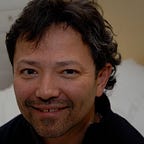The Ethical Political Continuum 1
An overview of some concepts from Deleuze and Guattari’s Capitalism and Schizophrenia.
This is the first of a series on the ethical and political theory of Gilles Deleuze.
Naturalist Approach
Deleuze is a naturalist:
Nature is all that there is. There is nothing that is supernatural.
Philosophy done well concerns itself only with nature, nothing transcendent of nature. And for Deleuze, naturalism is the view that nature must be affirmed:
The first philosopher is a naturalist: he speaks about nature, rather than speaking about the gods. His condition is that his discourse shall not introduce into philosophy new myths that would deprive Nature of all its positivity… One of the most profound constants of Naturalism is to denounce everything that is sadness, everything that is the cause of sadness, and everything that needs sadness to exercise its power. Naturalism makes thought and sensibility an affirmation. It directs its attack against the prestige of the negative; it deprives the negative of all of its power; it refuses the spirit of the negative the right to speak in the name of philosophy. (Logic of Sense)
Naturalism runs through all of Deleuze’s philosophy, whether it be ontological, epistemological or ethical. But it is his ethics that drives his naturalism forward.
Life, the power of life, is affirmed in his ethical thought. And this theme of the affirmation of immanence runs through directly to his social and political thought.
Ethics is inherently social and political, and the social and political are inherently a question of ethics.
Historical Circumstance
To be sure, not everything is positive and to be affirmed. A great deal of Deleuze’s thought on society and politics addresses realities that in his view are not acceptable or tenable. But he views such realities as reactive, disaffirming of life, historical artifacts.
The core of his thought is aimed at explicating a political theory that affirms life, one that runs continuously and congruently through all of his other ideas. His ethical naturalism is the starting point for understanding politics as immanence; and for understanding the transcendent in the social and political that attacks life.
For Deleuze, history is not irrelevant. While his political philosophy is a process philosophy of pure difference, it must address the historical complications we find ourself in.
The past, history, folds into the present, lives through the present virtually, and therefore must be incorporated into a vision of society.
But history does not bind us or permanently separate us from the virtual forces of difference that drive politics forward.
Political philosophy, while addressing the constraints of historical fact, must wade through those facts to get to the active and reactive forces at work.
Political theory is both critical and constructivist: it must affirm our world as a living, natural world; but also as a world we can live in, interact with and change.
Desiring Oppression
Deleuze’s collaboration Felix Guattari begins with the two volume set, Capitalism and Schizophrenia: Anti-Oedipus and A Thousand Plateaus.
In these books, Deleuze and Guattari fully naturalize the philosophy of difference, and set out to demonstrate how the objects of the world and the subjects that control them, and the knowledge that codifies them, are products of historical, political forces connecting with natural forces.
For Deleuze, the key question that political philosophy must answer is:
Why do people fight for their servitude as stubbornly as though it were their salvation? (Anti-Oepidus)
Why do we invest our human desire in a social system that oppresses us and introduces lack into our lives?
Desire is at the heart of his political philosophy. Desire is viewed as the central force that produces the social and political.
Desiring Production
As discussed in a recent article, for Deleuze, desire is a productive force. Desire overflows in productivity. Desire is not lack. Nor is pleasure the satisfaction of desire, except under a transcendent view of desire as lack. Lack results when we invest our desire in social formations that produce it.
Real desire overflows with a force of creativity, and is always more than the products which it creates.
It is no surprise then, that a central concept of Anti-Oedipus is one Deleuze refers to as “desiring-production.” Desiring-production is the equivalent of the virtual transferred to the registers of the natural and the historical.
Desiring-production is the pure force of nature and history that overflows, the process of becoming set in the natural, the psychological and the socio-political. Desiring-production is the real, generative force that creates natural and social reality.
Anti-Oedipus outlines how desiring-production, ie., the legitimate and immanent syntheses of desire (connections, disjunctions and conjunctions), and the production of the real, is inverted and usurped into illegitimate and transcendent syntheses, which create social formations that congeal and regiment, stifle and clog, the continuation of becoming, the unfolding of pure difference.
I hope you enjoyed this article. Thanks for reading!
Tomas
Please join my email list here or email me at tomas@tomasbyrne.com.
Excerpt from my forthcoming book, Becoming: A Life of Pure Difference (Gilles Deleuze and the Philosophy of the New) Copyright © 2021 by Tomas Byrne. Learn more here.
